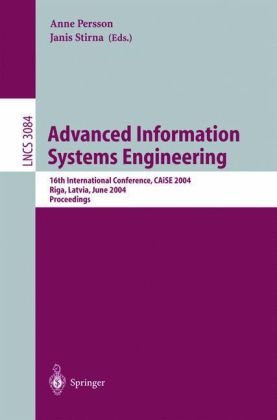

Most ebook files are in PDF format, so you can easily read them using various software such as Foxit Reader or directly on the Google Chrome browser.
Some ebook files are released by publishers in other formats such as .awz, .mobi, .epub, .fb2, etc. You may need to install specific software to read these formats on mobile/PC, such as Calibre.
Please read the tutorial at this link: https://ebookbell.com/faq
We offer FREE conversion to the popular formats you request; however, this may take some time. Therefore, right after payment, please email us, and we will try to provide the service as quickly as possible.
For some exceptional file formats or broken links (if any), please refrain from opening any disputes. Instead, email us first, and we will try to assist within a maximum of 6 hours.
EbookBell Team

0.0
0 reviewsth CAiSE 2004 was the 16 in the series of International Conferences on Advanced Information Systems Engineering. In the year 2004 the conference was hosted by the Faculty of Computer Science and Information Technology, Riga Technical University, Latvia. Since the late 1980s, the CAiSE conferences have provided a forum for the presentation and exchange of research results and practical experiences within the ?eld of Information Systems Engineering. The conference theme of CAiSE 2004 was Knowledge and Model Driven Information Systems Engineering for Networked Organizations. Modern businesses and IT systems are facing an ever more complex en- ronment characterized by openness, variety, and change. Organizations are - coming less self-su?cient and increasingly dependent on business partners and other actors. These trends call for openness of business as well as IT systems, i.e. the ability to connect and interoperate with other systems. Furthermore, organizations are experiencing ever more variety in their business, in all c- ceivable dimensions. The di?erent competencies required by the workforce are multiplying. In the same way, the variety in technology is overwhelming with a multitude of languages, platforms, devices, standards, and products. Moreover, organizations need to manage an environment that is constantly changing and where lead times, product life cycles, and partner relationships are shortening. ThedemandofhavingtoconstantlyadaptITtochangingtechnologiesandbu- ness practices has resulted in the birth of new ideas which may have a profound impact on the information systems engineering practices in future years, such as autonomic computing, component and services marketplaces and dynamically generated software.